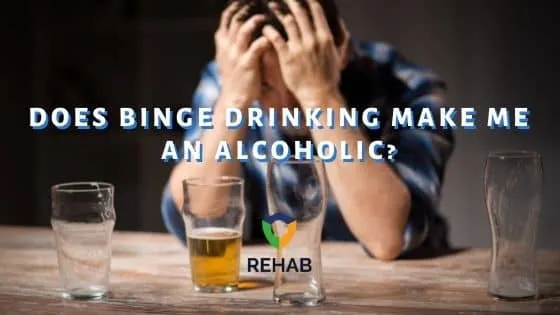Table of Contents
Millions of people in the United States live with an unhealthy relationship with alcohol. There is a spectrum of unhealthy behaviors related to alcohol use. Unhealthy behaviors range from occasionally drinking too much to end-stage alcoholism.
We know that prolonged, excessive alcohol consumption can lead to serious issues, including addiction and health problems. People who drink heavily for a long period are at increased risk of certain types of cancer, hepatitis, liver disease, brain damage, and heart disease.
Binge drinking is a common type of problematic drinking. Binge drinking is defined as drinking a large amount of alcohol in a short period. The effects of binge drinking can be serious. People who binge drink are at risk of accidents and injury, passing out, and risky behaviors such as unprotected sex and driving under the influence. But is binge drinking a sign of alcoholism?
This article will explore the difference between binge drinking and alcoholism. If you or someone you love needs support or treatment to overcome addiction or recover from problematic drinking, it’s important to get treatment as soon as possible. Reach out to the specialists at Rehab Recovery Centers to find the treatment programs and professionals you need.
Binge Drinking vs. Alcoholism
If you or a loved one lives with unhealthy drinking behaviors, it is important to understand the difference between binge drinking and alcohol addiction, as well as other forms of excessive drinking. These conditions are often treated differently.
Binge Drinking
The Centers for Disease Control (CDC) recommend that people drink alcohol in moderation to prevent harm to their health. But what does this mean?
For women, moderate drinking is defined as having no more than one serving of alcohol per day. Men are limited to two drinks per day. The CDC defines heavy drinking as more than 8 servings of alcohol per week for women and 15 servings for men.[1]
Binge drinking is defined for women as having 4 or more servings of alcohol during one occasion. For men, it means having more than 5 servings of alcohol during a short period. A person who binge drinks may not necessarily meet the criteria for heavy drinking if they do not drink excessively at other times during the week.
About ⅓ of Americans meet the criteria for excessive or heavy drinking, but only about 10% fit the criteria to be diagnosed with an alcohol use disorder (AUD).
Alcoholism
Alcoholism is a serious and sometimes life-threatening condition. Alcoholism is defined by a lack of control around alcohol consumption. People who have developed alcoholism often must drink to avoid uncomfortable or dangerous withdrawal symptoms. Other signs of alcoholism include:[2]
- Spending a lot of time thinking about alcohol, drinking, or recovering
- Feeling unable to stop drinking or reduce the amount they drink
- Continue to drink despite experiencing negative consequences
- Causing accidents or injuries while drinking
- Experiencing financial or legal trouble related to drinking
Alcoholism is a chronic condition that causes changes to the body and brain. Most people with alcoholism need treatment to overcome this condition. Without treatment, people are at high risk of serious consequences to their health, safety, and relationships.
Treatment for Binge Drinking vs. Alcoholism
People with any type of problematic drinking can benefit from the education and support provided in an alcohol addiction treatment program. The main difference between treatment for binge drinking vs. alcoholism treatment is that people who binge drink may be able to change their behaviors on their own. People with alcoholism almost always need treatment to overcome this serious, life-threatening condition.
Binge drinking is often treated with therapy that can identify the reasons for a person’s behaviors, education, and skill-building. People may participate in group therapy and holistic treatments that support whole-person healing as they work to change their relationship with alcohol.
Treatment for alcoholism generally begins with medically supervised detox. This allows people to go through withdrawal with the supervision and support they need to have a safe, complete detox process. After detox, people move on to a treatment program that can give them the skills and support they need to live a healthy, sober lifestyle. People with alcoholism must then make an aftercare plan that will help them stay engaged in recovery for the rest of their life.
Find Out How to Get Treatment for Problematic Drinking by Contacting Rehab Recovery Centers
If you or someone you love are living with problematic drinking behaviors or are concerned that you may develop alcoholism, reach out to the caring professionals at Rehab Recovery Centers.
We understand how important it is to get treatment as quickly as possible when you have an unhealthy relationship with alcohol. Our specialists will work to verify your insurance, recommend a level of care, and connect you with the right programs and professionals. We work to make the process as easy as possible so you can spend your time and energy on your recovery.
Don’t wait another day for the treatment you need. Contact Rehab Recovery Centers today to find an alcohol rehab center near you.
References:
Get Help Today
Don’t go through the process of recovery alone. There are people who can help you with the struggle you’re facing. Get in touch with one today.


